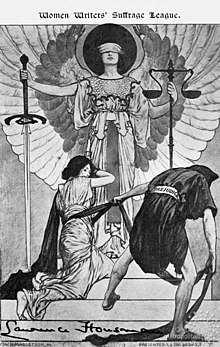Women Writers' Suffrage League
The Women Writers' Suffrage League (WWSL) was an organization in the United Kingdom formed in 1908 by Cicely Hamilton and Bessie Hatton.[1] This organization collaborate with other suffragette to bring social awareness and equality for women. They used their writings and plays to explain the current social situations and to send a message to its public.
The organization stated that it wanted "to obtain the Parliamentary Franchise for women on the same terms as it is, or may be, granted to men. Its methods are the methods proper to writers – the use of the pen."[2] The organization viewed itself as a writers' group rather than a literary society.[3] Membership was not based on literary merit, but instead was granted to anyone who had published a written work that had been paid for.[3] The league was inclusive and welcomed writers of all genders and political persuasions provided they were pro-suffrage.[3]By 1911 the league was composed of conservatives, liberals and socialists, women of power and women who worked hard and members of the military.[4]
This group made clear their hatred for androcentrism mocking in their writings while reading these works that discarded women as portions on plays, novels and family narratives, such as fairy tales.[4] They discussed current problems within society and came to a common conclusion; after the meetings they made these problems public so that people would be aware of what was happening. They sought to influence political and social changes through literature.
Contributions in newspapers
- Voting
- Common Cause
- Suffragette
- Votes for Women
- Women's Suffrage News
- Women's Suffrage Journal
- Women's Suffrage
- Women's Franchise
- Women's Dreadnought
- The Independent Suffragette
They also tried to take part in a public debate with the editorials of a conservative newspaper that went against the suffrage. Robins became famous for her defense of the cause against the anti suffragist Mrs. Humphry Ward in the Times.[4]
Plays
Below are some of the plays they did along with the AFL:
- How the Vote was Won[5]
- Votes for Women[5]
- A Pageant of Great Women[5]
- A chat with Mrs Chicky [6]
- Press Cutting [6]
This league not only repudiated anti-feminist writings. Along with Actresses' Franchise League they composed works, pageants and shows, some to pay tribute to Shakespeare for integrating and staking in his works the qualities of women.[4] In Shakespeare's Dreams, an arrangement by author and playwright Beatrice Harraden and Bessie Hatton, Portia, Viola, Perdita, Lady Macbeth, Rosalind, Kate, Beatrice, Puck, Ariel and Cleopatra appear before the sleeping poet and greet him, offering him flowers and reciting its most known lines.[4]
The active participation of men, as honorary associates of the league, also differentiated the WWSL from late-twentieth-century feminist literary groups.
As an act of service Elizabeth Robins, Bessie Hatton and Beatrice Harraden set up a library in the military hospital in Endell Street, London. They provided reading material to the wounded soldiers. [4]
Ending
"The WWSL was formally dissolved on the 24 of January, 1919; within a year of the passing of the 1918 Representation of the People Act."[3]
Notable members
WWSL had over 100 members, including several notable female suffrage authors:[3]
- Elizabeth Robins - First President
- Marie Belloc Lowndes - Vice President
- Margaret Nevinson - Treasurer
- Cicely Hamilton
- Bessie Hatton
- Beatrice Harraden
- May Sinclair
- Alice Meynell
See also
References
![]()
- ↑ Crawford, Elizabeth (2003) [First published 1999]. The Women's Suffrage Movement: A Reference Guide 1866-1928. Routledge. pp. 712–713. ISBN 9781135434021. OCLC 53836882, 475881247, 742299597.
- ↑ Robins, Elizabeth (1913). Way Stations. Hodder and Stoughton. p. 106. OCLC 654476659. Retrieved 4 August 2013.
- 1 2 3 4 5 Park, Sowon (June 1997). "The First Professional: The Women Writers' Suffrage League" (PDF). Modern Language Quarterly. 57 (2): 185–200. OCLC 91145060. Retrieved 14 February 2015.
- 1 2 3 4 5 6 "Howard Community College Library Off-Campus Access". link.galegroup.com. Retrieved 2018-05-08.
- 1 2 3 "Women Writers Suffrage League". Spartacus Educational. Retrieved 2018-05-10.
- 1 2 graeme@gelstudios.co.uk, Graeme Leighfield,. "How the Vote was Won and Other Suffrage Plays". Putney Theatre Company. Retrieved 2018-05-10.
